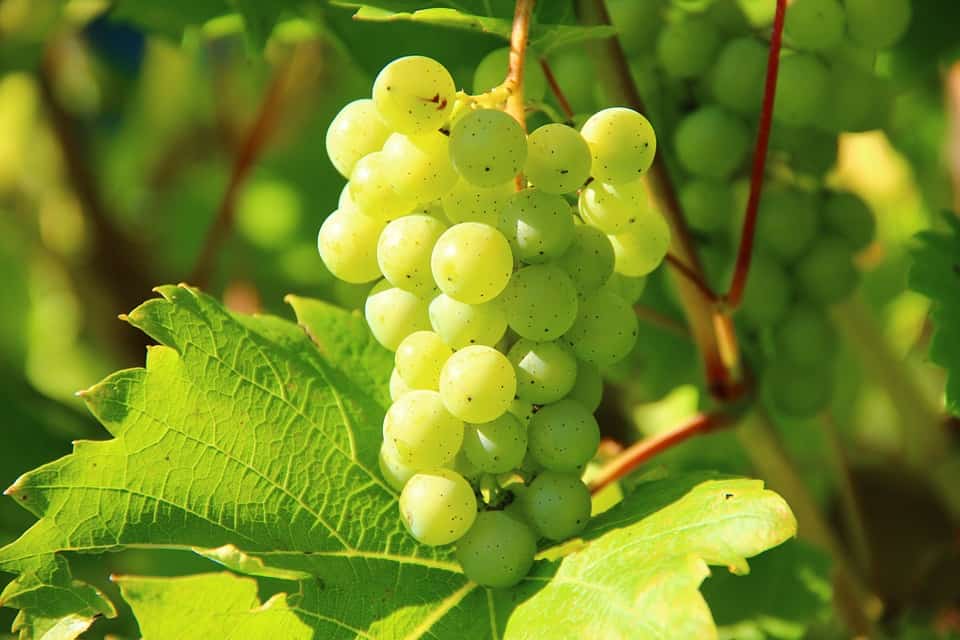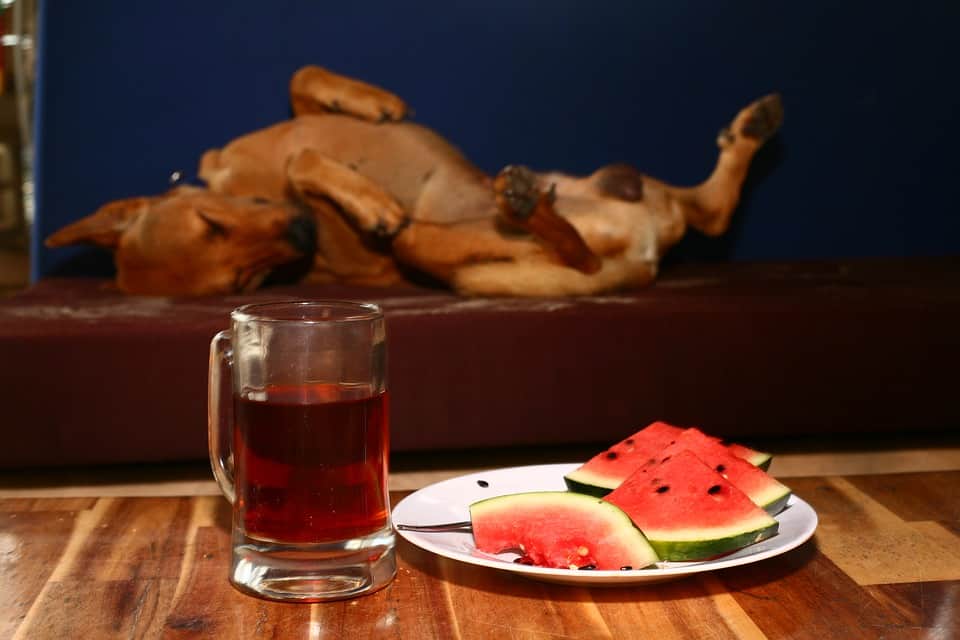
It’s no secret that dogs love human food. And, as long as you don’t mind a little begging, it is okay to slip them the occasional treat.
But, if you have a tendency to share your food with fido, it is a good idea to make sure what you are giving them is actually safe.
Dogs’ systems are very different from the human system, which means some foods that we eat without a problem are enough to make our dogs sick. And some can even be deadly.
Luckily, when it comes to fruit, there aren’t many items that pose that kind of danger, but that doesn’t mean all fruit is safe. Here are all the fruits your dog can and can’t have.
Fruits That Are Not Safe for Your Dog to Eat
Of all the different categories of human food, the fruit group poses the least risk for our canine friends, but there are still three types of produce you should make sure to keep out of your dog’s reach.
 While most fruits are unlikely to cause serious illness in your dog, grapes are an exception. Many dogs have developed severe kidney failure after eating grapes, and some have even died. It is best to keep grapes and raisins out of reach at all times.
While most fruits are unlikely to cause serious illness in your dog, grapes are an exception. Many dogs have developed severe kidney failure after eating grapes, and some have even died. It is best to keep grapes and raisins out of reach at all times.
Can Dogs Eat Grapes?
Grapes, by far, are the most dangerous fruit for dogs. Whether fresh off the vine or dried into raisins, this fruit can cause kidney damage and even death. The exact reason grapes cause toxicity in dogs is still not known. In fact, there have been just as many cases of dogs eating large quantities of grapes without any issue as there are cases of dogs eating only a few grapes and getting very sick.
To be safe, don’t let your dog eat any grapes or raisins. If they do get a hold of some of this dangerous fruit, watch them carefully for changes in behavior or other symptoms such as lethargy, increased thirst or urination, and loss of appetite. If they show any of these signs, it is best to get them to a vet right away.
Can Dogs Eat Avocados?
While humans love this strange vegetable-like fruit, most of the animal kingdom can’t consume them without risking illness or death.
Avocado leaves, pits, and skins have high amounts of a toxin called persin. While present in lower quantities, persin can also be found inside the smooth flesh of the fruit. Humans are very good at processing this particular toxin, so eating avocados, even in great amounts, doesn’t cause us any problems for us. But for other animals, especially birds and, to a lesser extent, dogs, this fruit can cause weakness and fluid accumulation around the heart and lungs.
While it is very rare for dogs to experience persin toxicity (in fact, there is an entire line of dog food that adds avocado oil to their kibble), it is still a good idea to be cautious with this food. Even if the persin doesn’t cause problems, the large pit could easily cause choking or obstruction if ingested.
 While much less dangerous than grapes, it is still a good idea to never feed your dog avocado. The leaves and pits, especially, may cause respiratory and cardiac problems. If you are lucky enough to have an avocado tree in your yard, make sure your pooch does not have access to it.
While much less dangerous than grapes, it is still a good idea to never feed your dog avocado. The leaves and pits, especially, may cause respiratory and cardiac problems. If you are lucky enough to have an avocado tree in your yard, make sure your pooch does not have access to it.
Can Dogs Eat Cherries?
Cherries are often included on toxic fruit lists and for good reason. Those tiny pits are full of cyanide, a toxin that interferes with cellular respiration in both humans and animals. If a dog ingests too many cherry pits they may develop symptoms such as dilated pupils, difficulty breathing, and bright red gums.
But, it is worth noting, that the fleshy fruit of the cherry is not dangerous for dogs and can even make a great high-antioxidant snack. If your dog gets ahold of pitted cherries, there is no reason to panic. But, if you have a cherry tree in your yard or have a bowl of fresh cherries out for snacking, be sure to keep your pup away.
Cherry trees aren’t the only toxin hiding in your backyard. Here are is everything you need to know about keeping your dog safe in the garden.
Fruits That Are Safe for Dogs
Most fruits are packed with vitamins and minerals, making them a great way to introduce some novel nutrition into your dog’s diet. However, fruit also contains a lot of sugar and starch, things that your dog was not made to digest. So, whatever the specific fruit, make sure you are feeding it sparingly.
Can Dogs Eat Apples?
Apples are a great treat for dogs and have a pleasing texture most pups enjoy. This fruit is full of fiber and only contains a moderate amount of calories compared to other fruits. Just be sure you remove the seeds before offering any apple to your dog. While these are unlikely to cause any issues in small quantities, they do contain toxins that may cause stomach upset, especially if ingested in higher amounts.
Apples in whole form aren’t the only way your dog can enjoy this fruit. Find out how apple cider vinegar can benefit your dog.
 Many dogs make a habit out of snacking on fallen apples in the fall. While eating any fruit in large quantities is likely to lead to diarrhea in dogs, this ritual is typically not an issue so long as the consumption of the fruit and its seeds is kept in check.
Many dogs make a habit out of snacking on fallen apples in the fall. While eating any fruit in large quantities is likely to lead to diarrhea in dogs, this ritual is typically not an issue so long as the consumption of the fruit and its seeds is kept in check.
Can Dogs Eat Berries?
Whether blue, straw, or raps, berries make great treats for dogs. Not only are they lower in sugar than many fruits, but they are packed with disease-fighting antioxidants and plenty of vitamins. Frozen berries make a great filler for treat balls in the summer (just keep the fun outside to avoid stained carpets) and blueberries, especially, make the perfect sized training treat.
Can Dogs Eat Bananas?
While not toxic, bananas are one fruit that your dog can have but may be better to avoid. Bananas are high in sugar and calories and, if fed too often, can even cause problems with electrolyte imbalances due to the high amount of potassium found in them. If your pup really loves bananas, you can give the occasional frozen slice as a treat, but don’t overdo it with this fruit.
Can Dogs Eat Cantelope?
Cantelope and other melons are another tasty treat that dogs can certainly tolerate and enjoy in limited quantities. They are lower in calories than bananas but still contain a lot of sugar, so it is especially important to restrict consumption in overweight dogs. They do, however, contain a lot of water, making them a great choice for snacking after a hot summer walk.
Can Dogs Eat Citrus?
Like Bananas, citrus fruits, including oranges, limes, and lemons, are not toxic for dogs but are probably best avoided. The acidic nature of these fruits means they can easily irritate the mouth and digestive tract. And, dogs struggle to digest the cellulose in citrus, making for quite the mess when they come out the other end. Since dogs, unlike humans, make their own vitamin C, there aren’t many benefits to feeding this fruit, but there are some drawbacks.
 Many fruits are too high in calories and sugar to be fed often as treats, but there are plenty of veggies your dog can snack on more regularly. Carrots, pumpkin, and cucumbers all make great choices.
Many fruits are too high in calories and sugar to be fed often as treats, but there are plenty of veggies your dog can snack on more regularly. Carrots, pumpkin, and cucumbers all make great choices.
Can Dogs Eat Cranberries?
Fresh and dried cranberries make a great treat for dogs and a perfect replacement for raisins in your gorp if you like to share with your pup. Like other berries, cranberries are low in sugar and full of antioxidants. And, they are the perfect size for a small treat that won’t upset your dog’s stomach or wreck their appetite.
Can Dogs Eat Mango?
Mangos are another high-nutrient treat that dogs can benefit from on the occasion. They contain vitamins A, B6, C, and E as well as beta-carotene and potassium. But, they also contain a lot of sugar, which is why the “occasional” piece is important. Be aware these fruits also have a large pit that should be removed before you let your pup start snacking.
When your pup gets sick of fruit, try these homemade dog treats instead!
Can Dogs Eat Peaches?
Stone fruits like peaches, nectarines, and plums are all acceptable snacks for fido. But, they do all contain pits of varying sizes that can cause serious issues if ingested. If your dog has a taste for these sweet fruits, it is best to only offer them a few slices at a time while making sure to keep that pit out of their reach. Frozen peach, especially, makes a great summer treat.
Can Dogs Eat Pineapple?
Pineapple packs a unique nutritional profile that many dogs will benefit from. One of the most beneficial things about this fruit is that it contains a high amount of bromelain. This enzyme is helpful for increasing protein absorption and can even ease muscle discomfort. Of course, like other sweet fruits on this list, it is best to feed pineapple only on the occasion to avoid adding too many calories to your dog’s diet.

A little watermelon or cantaloupe at the end of a long, hot day is a great way to rehydrate your pup while giving them a special treat they won’t soon forget.
Can Dogs Eat Watermelon?
As sweet as this treat is, it is actually mostly water–about 92% to be precise. This makes watermelon an excellent treat for dogs of all types, and an especially good choice for pups who struggle to stay hydrated in the heat. Just be sure to get the seedless variety to avoid stomach upset and cut off the hard rind before offering it to your dog.
The Bottom Line on Feeding Dogs Fruit
With the exception of grapes, avocado, and cherry pits, most fruit is perfectly fine to give to fido, though there are some better choices than others. And in any case, always remember moderation is key.
Dogs are carnivores by nature and were made to extract everything they need from animal products. Assuming your dog is on a high quality raw, home-prepared, or commercial diet, adding fruit to their treat rotation probably won’t add much in the way of needed nutrition. But it can be a great way to stimulate your dog’s mind by introducing them to fun new tastes and smells.



